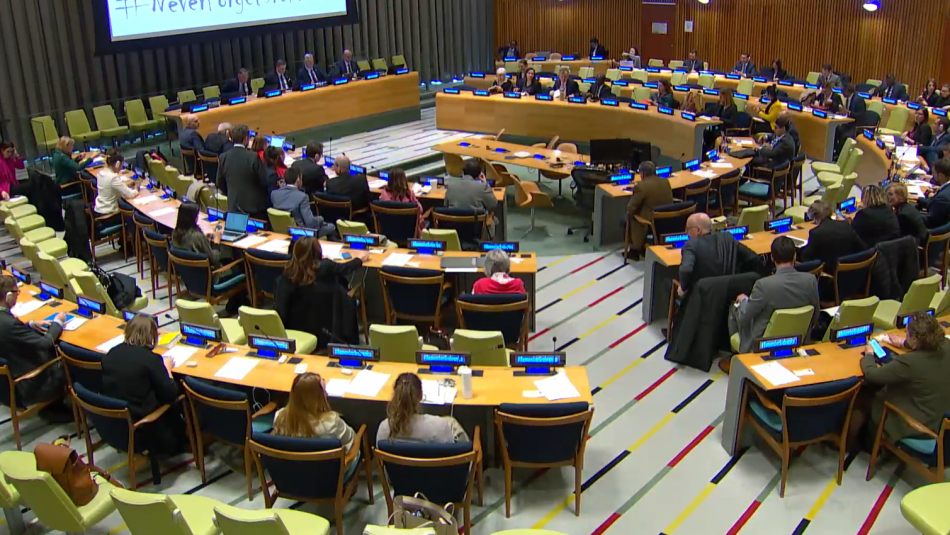Announcements
Azir Osmanović, genocide survivor and curator at the Srebrenica Memorial Center addressed today at the UN. Read the entire speech below.
Esteemed members of the Presidency of Bosnia and Herzegovina,
Distinguished Ambassadors to the United Nations,
Esteemed Ambassador Lagumdžija,
Dear friends,
Thank you for the opportunity to address you all today.
My name is Azir Osmanović. As a thirteen-year-old boy, I survived the genocide committed in and around Srebrenica between July and October 1995. I have dedicated my entire adult life to collecting material and documentary evidence about the life and disappearance of my community: the Bosniak Bosnian Muslim community in northeastern Bosnia. Despite everything, I live in Srebrenica with my wife and three kids, and for the past 15 years, I have worked as a researcher, curator, and finally as a head of the museum-archival team at the Srebrenica Memorial Center.
Therefore, my address today is twofold: I address you today as a surviving witness of genocide but also as a guardian of the culture of remembrance of the genocide in and around Srebrenica. As a survivor, I am adding my voice to the rightful call for the designation of 11 of July as an International Day of Commemoration for the Srebrenica Genocide.
On March 25th, 1993, when I was 11 years old, my family and I were forced to leave our village as a result of “ethnic cleansing” – that is to say, the systematic expulsion, persecution, and destruction – at the hands of the Yugoslav Army and the Army of Republika Srpska. Fleeing the barrage of bullets and grenades, we reached the village of Pusmulići, near Srebrenica. At the time, I thought that we would all be killed and that no one could save us. As a child, I witnessed death all around me. In early April 1993, my fifteen-year-old cousin Fikret and my seventeen-year-old cousin Edina were killed. They were only children. The attacks on Srebrenica grew stronger and stronger, and the fear of death among us intensified.
It was then, as a child, that I first learned about the United Nations. With thunderous applause, immense excitement, and tears of joy, we, the children and women of Srebrenica, welcomed General Morillon’s promise that the enclave would become a UN “safe area.” This came to pass in April 1993 with the adoption of Resolution 819 by the Security Council. After about two years of relative calm under the protection of the UN, the Bosnian Serb army resumed its attack on the enclave on July 6th, 1995, at 3:15 am. From the 16-square meter roomwhere my parents, two brothers, sister, and I had been living as refugees in the southern part of
the enclave, we were once again forced to flee. This was to mark the beginning of the longest chapter of my life, a chapter that still continues and that has led me here to this room to meet with you.
After Srebrenica fell to the army of Ratko Mladić, I parted ways with my father and older brother, who was then 16 years old. They went through the woods hoping to reach free territory, while I went with my mother and my two other siblings to the UN base in Potočari. Like more than 20,000 other children, women, and elderly people, I prayed that my family and I would be admitted inside the base and, thus, I believed, saved. In my case, this wish was not fulfilled. According to the judgments of the International Court of Justice in The Hague, the Srebrenica genocide began on July 11th, 1995, and lasted for approximately one week. For me, however, it began several days earlier, at the very least – with the start of the military operation that forced me to flee, day by day, under the relentless army attack led by Ratko Mladić, now convicted for the genocide in Srebrenica by the ICTY. For me, and I believe for all of Srebrenica’s survivors, the genocide lasted much more than one week.
I do not know why I survived to stand before you here today when I could have easily been among the 2,000 other men and boys who were sentenced to death at a military checkpoint of the Mladić Army placed just outside the UN base. I witnessed this screening. I watched as they were pulled aside, taken away, thinking all the while that I would be next. My cousin Dahmo, who was just two years older than me, was taken away, together with my grandfather Abdullah. I still think of Dahmo every time I enter the former UN base. He was killed in the genocide, as were his four brothers (Amil, Nazif, Avdija, and Hazim), his father Ćamil, and his uncle Bajro, who was mentally disabled. Every single male member of the Suljić family was killed. And many families, in fact, met the same faith.
In the weeks and months after the genocide, the bodies of those executed were scattered and buried throughout the region using heavy machinery. This is the legacy that the Army led by Ratko Mladić, in its depravity, bequeathed to the world: mass graves further desecrated, remains of many uncovered in three or more mass graves. My older brother Azmir was buried two and a half years ago in the cemetery of the Srebrenica Memorial Center—Actually, only his skull was buried, which was all we have been able to find of his remains. And as if one personal tragedy was not enough, my younger brother Alaga committed suicide three and a half years after the genocide, at the age of 11, as a result of the trauma he experienced. My father, Aziz, hid in the woods for two months after the fall of Srebrenica, arriving in the territory under the control of the internationally recognized government of the Republic of Bosnia and Herzegovina only on September 11th, 1995. Ten years before his death, he was diagnosed with Post-Traumatic Stress Disorder as a result of genocide and struggled with it until the end of his life.
This is the fate of the survivors of Srebrenica. To this day, we live with the trauma of what we endured, and we will continue to live with it for the rest of our lives. Today, after almost three decades, I stand before you at the Headquarters of the United Nations, seeking recognition for all that we have suffered and continue to endure. Our struggle, unfortunately, is far from over. On a daily basis, we are subjected to rampant and ruthless genocide denial, historical revisionism, and the threat of renewed violence. International recognition of the Srebrenica genocide as a universal tragedy would help to stem this tide once and for all and, through global awareness, ensure that no other community, anywhere in the world, comes to share our fate. But just as we share a common fate, we share a common hope: that we can protect future generations from these experiences, that we will not impart our trauma to our children, only our wisdom, and that together, we will create a world in which they can live without fear, without genocide.
Therefore, as the head of the museum-archival team at the Srebrenica Memorial Center, and in preparation for the commemoration of the 29th and 30 th Anniversary of the Srebrenica Genocide here at the UN, I underline the importance of preserving the truth, sharing our stories, remembering lives lost. They are not mere numbers. They were people with names, families, dreams. And their mark on this Earth we are bound to preserve. One of the exhibits we plan to share with you in July will trace the footsteps of those who tried to flee Srebrenica but never made it. It shows footwear from humanitarian aid that I wore in Srebrenica, as did thousands of other residents. We called them mrtvare, “dead man’s shoes,” a name that now seems darkly prophetic. I am here today in the hope that no child, ever again, has to walk in “dead man’s shoes.”
Ladies and gentlemen,
On behalf of the survivors of genocide, on behalf of all who work in the name of justice and peace, of preserving truth – I urge you to adopt this resolution. The thousands of innocent lives lost during the Srebrenica genocide can never be recovered, and the wounds of those they left behind can never be fully healed. However, with this resolution, you have the opportunity to honor the lives of the thousands who were unjustly killed and to make a meaningful difference in the lives of those who have been unjustly robbed of everyone and everything they hold dear. You, as Member states of the UN, have the opportunity to put an end to genocide denial and stop the glorification of violence. To help our struggle to find the remains of our loved ones so that they may be laid to a dignified rest. To impart the lessons of Srebrenica to the world and ensure a more peaceful future for our children. By designating July 11 th as the International Day of Reflection and Commemoration of the 1995 Genocide in Srebrenica, you confirm the judicially established facts of the Srebrenica genocide and stand on the side of truth and justice.
Excellencies, dear friends,
Thank you.






